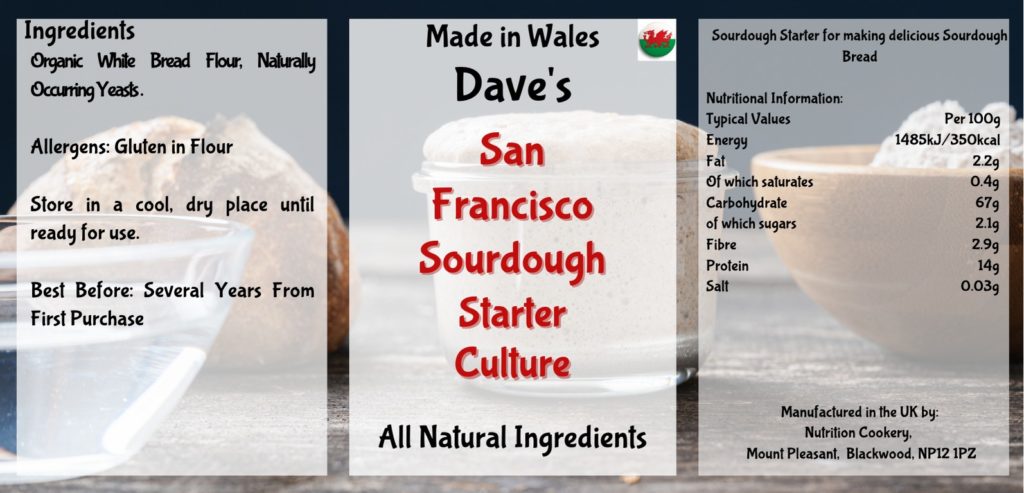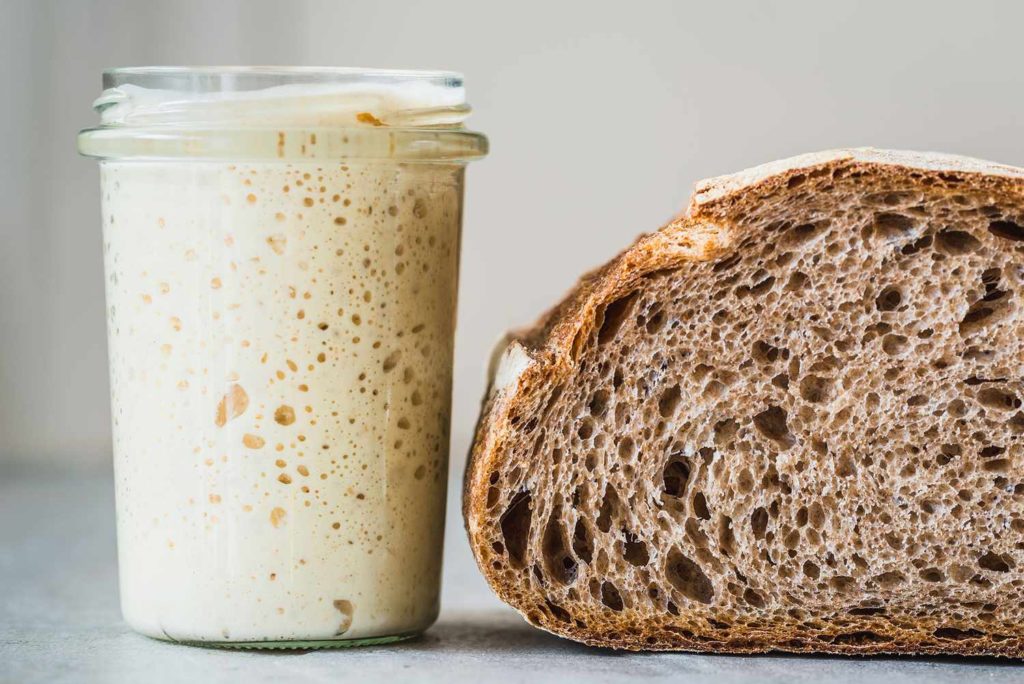

San Francisco Sourdough Starter Culture
Get Baking! For a limited time enjoy Free Shipping on ALL orders!
Shipment Includes: One packet of dried, active San Francisco sourdough starter culture, written instructions for activating and maintaining the starter, as well as some practical advice and recipe links that can put even a first time baker on a path towards making great bread!
HISTORY OF SOURDOUGH BREAD
Sourdough bread traces its origins to ancient Egypt and is common in parts of Europe.
San Francisco is synonymous with sourdough bread, which has a rich history dating back to the gold rush era that began in 1848. Miners would often carry sourdough starters with them on their journey to ensure they’d always have access to freshly baked bread. Gold miners valued it for their camps because of its durability, and the relative ease of obtaining yeast. Although many different kinds of pre-ferment (a dough-like mixture of fermented flour and water containing bacteria and wild yeast) are suitable for making sourdough, specific species of bacteria (Lactobacillus sanfrancisco) and wild yeast (Candida humilis) have been identified as the predominant cultures in local breads. Sourdough starters were carefully kept and maintained by each bakery as a “mother sponge”
Bread was not only easy to transport and a great source of nourishment throughout the day, but also a means to trade for other goods.
The prices of everything from food to supplies skyrocketed during the gold rush due to the influx of optimistic hopefuls looking to get their hands on a piece of the fortune. At the time, eggs were selling for $3 apiece, and a slice of buttered bread would go for as much as $1 — that slice of bread would be over $30 today!
By 1854 there were 63 bakeries in San Francisco.
In 1849, Isidore Boudin, son of a family of master bakers from Burgundy, France, arrived in San Francisco and opened Boudin Bakery. He combined French bread-making techniques with a starter he had received from a miner, and the signature San Francisco sourdough was born. This 19th-century starter lives on to this day and gives Boudin’s breads their unique flavour and texture.
If you are lucky enough to visit San Francisco, go to Fisherman’s Wharf and check out the Boudin Bakery, it is huge. You can see the conveyor belts moving all the sourdough bread around the factory. Also find the cafes that serve Clam Chowder in a hollowed out Sourdough Loaf. Absolutely delicious.
Recently, there seems to be a renewed interest in sourdough bread, with hundreds of people developing their own starters and practicing home-made recipes. Though making sourdough bread has become a popular activity, the bread has been around for thousands of years. It is the oldest type of leavened bread (bread that rises due to yeast or other ingredients) on record, and it’s enjoyed in many cultures around the world.
Instead of using baker’s yeast, sourdough bread relies on a starter: a mixture of water and flour that develops a population of wild yeast. This yeast produces lactic acid, the source of sourdough bread’s distinctive tangy taste. This acid both flavours the bread and kills unwanted bacteria, keeping a sourdough starter safer from going bad.
Today, sourdough bread can be made at home or bought in stores throughout the country. Many people tout the health benefits of sourdough bread, but it’s still not for everyone. Here’s a breakdown of the benefits of sourdough bread.
Nutrition Information
An average one slice of sourdough bread (about 50 grams) contains:
Calories: 185
Protein: 2 grams
Fat: 1 grams
Carbohydrates: 36 grams
Fibre: 1 gram
Sugar: Less than 1 gram
Sourdough bread is an excellent source of:
Calcium
Potassium
Magnesium
Folate
Niacin
Sourdough bread is also an excellent source of antioxidants.
Studies have shown that antioxidants, like the peptides found in sourdough, can lower the risk for certain types of cancer, signs of aging, or chronic diseases like rheumatoid arthritis.
Potential Health Benefits of Sourdough Bread
Sourdough bread is a rich source of vitamins and minerals.
General Body Functions
Sourdough bread is particularly rich in nutrients that the body can easily absorb. This is due to the way that the lactic acid bacteria in the bread interacts with these nutrients. These bacteria destroy certain types of acid commonly found in other types of bread, which increases the availability of nutrients like folate, potassium, and magnesium.
Your body needs folate to divide cells and make DNA and other genetic materials. Potassium also aids in the function of your cells. It regulates your heartbeat, helps your nerves and muscles function properly, and is necessary to make proteins and metabolize carbs. Magnesium regulates your muscle and nerve function, controls blood sugar and protein levels, and helps make protein, bones, and DNA.
Disease Prevention
The lactic acid bacteria are also responsible for increased antioxidants in sourdough bread compared to other types of bread. Antioxidants protect your cells from damage that cause serious diseases such as cancer, heart disease, Alzheimer’s disease and more.
Lower Blood Sugar Levels
Eating sourdough bread may help you keep your blood sugar levels more stable than if you were to eat white bread. The bacteria that helps form sourdough also have a unique effect on the starch in the bread.
It changes the structure of the bread molecules — making your body absorb them slower, which lowers the bread’s glycaemic index. This means that your insulin levels will not spike as high after eating a slice of sourdough bread as they would after eating white bread.
Improved Digestive Health
Sourdough bread may be easier to digest than white bread for some people. According to some studies, sourdough bread acts as a prebiotic, which means that the fibre in the bread helps feed the “good” bacteria in your intestines. These bacteria are important for maintaining a stable, healthy digestive system.
Sourdough is also lower in gluten than other forms of bread. It appears that the acid in the bread degrades gluten. As a result, people with gluten intolerance may find that sourdough is easier on their stomachs.
Cost is £9.70 with FREE shipping on all orders